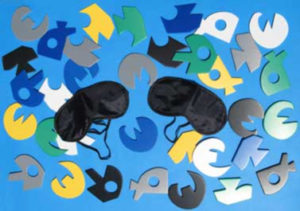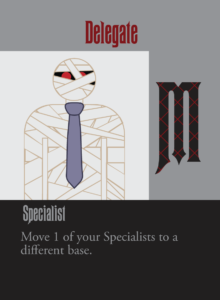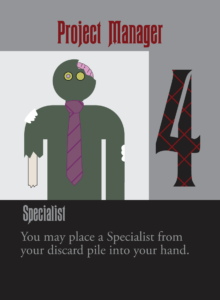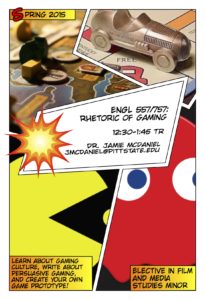
My current professional writing research examines the processes through which ableism becomes embedded within visual, online, and workplace discourses. Instead of focusing on people with disabilities, the disabilities themselves, or retrofits to existing technology as is traditionally the case, I use theories from rhetoric and disability studies to understand the strategies of ableism that marginalize people with disabilities. These strategies include tactics of dispersal (making sure that people with disabilities do not group together–dispersal of potential power they might find in organizing) and defensive Othering (promoting the act of passing as ablebodied and then punishing those who fail to pass). For example, I see the procedural arguments inherent in professional training games such as Elite Training’s Colourblind II as employing metaphors that presume disability to be a naturally undesirable way of experiencing the world and, more importantly for the workplace, as an especially undesirable characteristic of an employee. As a result of my scholarship on professional games, procedural rhetoric, and critiques of ableism, I am currently working to extend this approach to gaming business spaces: game stores, game conventions, game development businesses, and online spaces devoted to tabletop gaming, such as Facebook groups and Kickstarter. Using the framework of constitutive rhetoric, for example, I have begun to examine the ways in which a local game store offers the potential to call their customers into the performance of a particular type of gamer identity through documents advertising game nights, posted rules of behavior, and the design/layout of the store. This “ideal” gamer identity does not account for and often implicitly excludes potential gamers with disabilities. Alongside my work on ableism and professional games, I have presented widely on professional writing program administration at regional comprehensive universities and the identity of professional writing students in multi-focus English Studies programs.


My research has influenced my teaching in a number of ways. As the former Director of Professional Writing at Pittsburg State University, I make sure that accessibility and usability are core topics in PSU’s gateway class for the Professional Writing Emphasis and in our service course for the College of Technology. I have also taught a class on the rhetoric of gaming in which one group developed a tabletop game about recognizing privilege and developing ways to counteract racism, sexism, ageism, and ableism, and I led an independent study in which we adapted web accessibility guidelines to create a tabletop game about professional writing. In addition to this work on accessibility and usability, I have taught courses on grant writing, document design, and introductions to technical/professional writing. Finally, I have directed a number of professional writing internships ranging from editing to public relations writing.

Because of my expertise in professional writing and document design, I took on the role of public relations guru for PSU’s English and Modern Languages Department. I have also revamped a number of forms and other documents for local nonprofits.
Selected Professional Writing Sample Syllabi and Assignments
English 815: “Writing for the Profession.” (PDF)
This face-to-face course is designed to help you learn to write as a professional in Literary Studies, Creative Writing, Technical / Professional Writing, and Rhetoric / Composition. We will concentrate on form and style in each of these emphases as a way to discuss the common ground each emphasis shares in addition to exploring the defining characteristics of each emphasis. You will develop your ability to write in a variety of forms, including the researched literary interpretation, wiki entry / research overview, grant proposal, book review, and a variety of common professional documents. You will also be developing your style by working on clarity, grace, and appropriate diction, which changes with the audience and purpose of each piece. One goal is for you to be able to write strong papers for your Masters level classes, but the ultimate goal will be for you to write something that is refined enough to be submitted to a professional journal. Along the way, you will be finding your voice and progressing as a writer in general.
Sample Assignment: CompFAQ Wiki Contribution (PDF)
English 557/757: “Topics in English— Persuasive Gaming.” (PDF)
Even those outside of the “hobby” recognize games as the fastest growing media field. Despite their increasing popularity and sophistication, games receive an underwhelming lack of scholarly attention. And though growing, their pedagogical impact is even lower—rarely do games show up in education. In designing this class, I hope to correct these oversights by addressing two important, interlocking issues:
- First, how can traditional humanities/critical methods inform the way we think about and appreciate games?
- Second, how can games help us invent new critical methods?
For many in the humanities the first question is the easier to address, since it simply encourages us to apply our existing critical models to new, emerging forms of media (note the use of the plural here–to refer to video games as one monolithic genre is akin to referring to literature as one amorphous pile of books; game genres, like literary genres, are diverse and uneven). The second aspiration is a bit more ambitious, since it suggests that attending to games will require us to invent new methods for critical analysis—and that games might render some of the older methods irrelevant.
Sample Assignment: Gaming Discourse Community Essay (PDF)
English 695: “Professional Writing Internship.” (PDF)
ENGL 695 Professional Writing Internship provides a professional writing experience in a business or organization. It is designed to provide not only professional experience in the field of Professional Writing but also the ability to look at that experience from a critical perspective.
English 501: “Document Design.” (PDF)
In this face-to-face class, we will focus on the analysis and design of technical / professional documents, both printed and electronic. In this class, “document” takes on a comprehensive meaning to include print (posters and forms), audio (podcasts), audiovisual (videos), and digital (websites). We will study both the theory of and the practice of creating these documents.
This course should help you achieve the following goals:
- Recognize visuals, type and space as the building blocks of graphic design as visual communication.
- Approach functional graphic design as capturing attention, controlling eye flow, conveying information, and evoking emotion.
- Practice the researching, brainstorming, concepting, and sketching that go into effective design work.
- Demonstrate basic design and layout skills, including grid structure, across a variety of formats and platforms from electronic to print.
- Apply the fundamentals of working with typography, color and visuals, such as photos and illustrations.
- Familiarize yourself with prepress and pre-production processes.
- Appreciate visual aesthetics as historically and culturally contingent.
- Make a habit of considering the ways visual and symbolic communication can be inclusive, cover the under-covered, and mitigate bias and prejudice.
- Practice constructive design criticism.
- Apply the best practices of instructional design and usability.
- Produce some work for your portfolio using a content management system.
Sample Assignment: Multi-Page Document Assignment (PDF)
English 306: “Theories and Technologies of Writing.” (PDF)
This face-to-face class examines three interrelated areas of inquiry concerning writing as a discipline and topic of study:
- Theories of Writing: We will look at prominent ideas and concepts that shape contemporary understandings of writing, especially the writing process; social construction and the rhetorical situation; genre; and academic integrity. In addition to reading the work of experts, we will discuss their own writing processes and how motivation, circumstances, and external expectations shape the writing process.
- History and Materiality of Writing: Because the written word is inseparable from the technologies used to produce it, we will examine the history of writing and the technologies of writing. We will look at how aspects of writing have changed over time due to sociocultural shifts and the role technology has played in those changes.
- Technologies and the Future of Writing: Readings and discussions will introduce us to key theories that have contributed to the evolution of the technologies of writing. We will look at two “case studies” involving digital writing.
Sample Assignment: Unessay Assignment (PDF)
English 301: “Technical/Professional Writing.” (PDF)
English 301 Technical/Professional Writing is a face-to-face course designed for those students who will be writing in the technical professions. You will learn how to create correspondence, descriptions, instructions, reports, and electronic presentations. You will also learn how to design documents and how to incorporate graphics into your documents.
Sample Assignment: Proposal (PDF)
Selected Professional Writing Scholarship
This project builds upon recent work in disability studies, rhetoric, and professional/technical communication, especially Fiona Kumari Campbell’s Contours of Ableism: The Production of Disability and Abledness, Ian Bogost’s Persuasive Gaming: The Expressive Power of Videogames, Maurice Charland’s and James Boyd White’s concepts of constitutive rhetoric, Sushil Oswal’s research into accessibility and participatory culture, and Lisa Meloncon’s edited collection Rhetorical AccessAbility: At the Intersection of Technical Communication and Disability Studies. What this project introduces to this rich discussion of disability in professional rhetorical contexts is the argument that tabletop gaming—as both an increasingly important economic sector and as a communication practice within businesses—remains a particularly inaccessible and ableist part of the commercial world. It also follows the current trend in disability studies to weaken negative stereotypes by shifting attention from the person with a disability or individual impairments and redirecting it toward the strategies used to define the standards of an ideal, non-deviant, and ableist body. American and British policies such as the 1990 Americans with Disabilities Act and the Equality Act 2010 have often shaped practices in ways to counteract ableist assumptions embedded in workplace contexts, including business and professional communication. However, as Oswal observes in his advocacy for participatory design, many of these so-called fixes act as “retrofits” that further ostracize people with disabilities by marginalizing their needs in the design and development of various media. The needs of people with disabilities become little more than afterthoughts.
A professional game is a participatory communication activity in which businesses use elements of play to achieve a meaningful purpose, such as teambuilding. Most often, they consist of a tabletop game or simulation in which players attempt to reach a specific state of affairs only by means permitted by a set of rules and intend to communicate best business practices. In this presentation, I assess how professional games communicate in ableist ways. These games promote the belief that the ideal skills of an ideal worker necessitate an ideal body. Consequently, people with disabilities function less effectively than this ableist ideal and, thus, are rendered unqualified to meet the challenges that accompany leadership positions. Building on what Fiona Kumari Campbell has called “the maintenance of abledness” in modified bodies and Ian Bogost’s concept of procedural rhetoric, I argue that persuasion in professional games brings together game design, disability studies, and professional communication in ways that show how games might ostracize employees with disabilities. To demonstrate how, I examine a selection of professional games from Elite Training.
This presentation presents some highlights of a pilot study that provides potential answers to this question using David Sapp’s concept of the “Lone Ranger” writing program administrator. In his article “The Lone Ranger as Technical Writing Program Administrator,” Sapp defines this moniker in terms of technical/professional writing administrators who may experience a marginalized position within literature-centric English departments that contain emphases, minors, or degree programs in Technical/Professional Writing. Sapp explains that many universities have sought to hire qualified technical writing faculty to develop programs because these programs have become increasingly attractive to students and boast high postgraduate employment numbers (with equally high starting salaries allowing pay back of student loans). These candidates are usually the only one or one of few writing faculty members in the department, and their hiring administrators often promise the independence to develop new programs and administrate old ones in ways that would likely be impossible at other, typically larger, institutions. However, Sapp argues that these Lone Ranger program administrators often encounter major problems in their new positions. He then provides his personal Lone Ranger narrative, interviews with other Lone Rangers, and strategies to negotiate this difficult position. Through interviews with students and alumni from Pittsburg State’s own multi-focus writing program, I seek to understand how administrators’ positions as Lone Rangers may affect student and alumni perceptions of writing programs and their willingness to collaborate once they have entered industry. Are there Lone Ranger technical writing students, and, if so, how might this perception influence later job prospects and industry collaborations? This data offers glimpses of the Lone Ranger that extend from the classroom to the workroom, including a sense of intellectual loneliness and elitism, lack of community building, and co-workers who misunderstand the discipline.
Selected Professional Writing Service
Advertising Flyers for English Courses (PDF)
Revised Basic Intake Form for Southeast Kansas Community Action Program (PDF)
